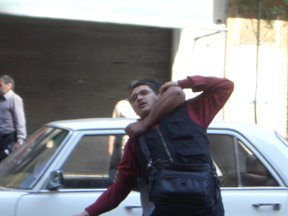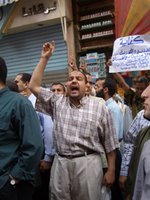An Overview of a Week of Arrests
The following statement was released by a coalition of Egyptian human rights NGOs this week:
Until Saturday morning, the 29th of April 2006, the following was the outcome of the Egyptian regime’s campaign to oppress the political and democratic change movement which organized in support and solidarity with the movement of Egyptian judges demanding the independence of the judiciary from all other authorities, foremost the executive authority:
I. First round of arrests at dawn on the 24th of April 2006:
Several have been arrested, 12 of them have been referred to Kasr el Nil prosecution office (case no. 5476/2006), the prosecution ordered a 15 days extension of their imprisonment and based its decision on the authority of the state security prosecution derived from Article 10 of the emergency law. Names of those arrested in this round:
II. Second round of arrests:
The second round took place on the 26th of April 2006. 16 individuals were summoned to state security prosecution on the 27th of April in high state security case no. 415/2006, which ordered a 15 days extension of their imprisonment. Those are:
Akram Ali Helmia, Bahaa Saber Hemeida, Gamal Abdel Fattah, Hussein Mohamed Ali, Ibrahim El Sahari, Kamal Khalil, Malek Mostafa Mohamed, Moh. Abdel Rahman Kamel, Mohamed Adel Fahmi, Moh. Ahmed el Dardiri, Mohamed Fawzi Imam, Saad Abdallah Hamdi, Saher Ibrahim Gad, Sameh Mohamed Said, Sami Hassan Diab, Yasser El Sayyed Badran
III. Third Round of arrests
The third and most violent round took place on the 27th of April, which is the day of the judges’ extraordinary general assembly meeting. The day witnessed the climax of both the solidarity movement of the judges and also the police aggression against supporters. We do not have an accurate account of the numbers of people arrested, but the following are the names of those who were interrogated by the state security prosecution on the 28th of April 2006, all within the same high state security case no. 415/2006, which again extended their imprisonment of 15 days.
Ali Fathi Ali, Ashraf Ibrahim Mohamed, Emad Fahim Abdel Ghani, Fathi Abdel Raouf, Hamdi Abou El Maati Kenawi, Hani Lotfi El Sawi, Ibrahim abdel Aziz Abdel Dayem, Ibrahim El Sayyed Attia, Karim Mohamed, Mohamed Abdel Latif, Wael Ahmed Khalil
On the same day another list of names was brought to the prosecution. However they were not interrogated and until now we have no information regarding the charges against them nor their legal status. Those are: Hamada Ragab Ahmed, Ibrahim Mohamed Bahgat, Fayez Hassan Oloum, Sayyed Hassan Abdel Aziz, Ashraf Moh. Abdel Aziz, Walid Gamal Arab, Mubarak Salem Sayyed, Wael Hassan Mohamed, Hamada Moh. Ramdan, Sayyed Mahmoud Moh., Ahmed Gomaa Ahmed, Ibrahim Belal Ibrahim.
During the interrogations a long list of other names were mentioned, charged of agitating demonstrations, distribution of leaflets, destruction of public and private property and blocking the traffic.
All of them are held in the high security Torra prison.
IV. Fourth Round:
On the morning of the 29th of April 2006 police arrested Ihab el Kholy and Amir Hamdi Salem, whose names were among those mentioned in the interrogations. They have been released later in the day.
Charges:
The following are the charges against the various protesters, with small variations among them:
Gathering of more than 5 people with the aim of disrupting the general authority from carrying out its job.
Insult of the president of the republic using public means such as shouting, chanting and writing.
Dissemination of provocation propaganda and malicious rumors which could disrupt public security and cause damage to public interest.
Deliberate block of traffic.
Verbal aggression against police officers while carrying out their job.
Possession of leaflets prepared for distribution and printing tools (spray)
Destruction of some public and private property.
Blocking the roads without permission from relevant authorities.
Agitation to organize demonstrations, distribution of leaflets, and block of traffic.
Legal base for charges
I. Criminal code
Article 179: Imprisonment for the insult of the president; Article 184: Imprisonment and/or 5000-10000 LE fine for insult of parliament, Shura council, army, courts, authorities or public institutions; 15 years imprisonment/ with hard labor for deliberate block or disruption of safety of public transportation; Article 133: No more than 6 months imprisonment or no more than 200 LE fine for verbal or nonverbal insult or threat of public servant or police officer or anybody in charge of a public service during exercise of job; Article 102: Imprisonment and 50-200 LE fine for deliberate dissemination of false news, information, rumors or agitating propaganda which could disrupt public safety, disseminate fear among citizens or damage public interest; also for possession of publications containing any of the above if they were intended to show to others; also for possession of any tool of printing, recording or publicity used, even if temporary, to print or broadcast any of the above; Article 90: Imprisonment no longer than 5 years for deliberate damage of public buildings or possessions or government buildings.
II. Law no. 10 concerning gathering
Article 2: No more than 6 months imprisonment and no more than 20 pounds fine for anybody who participates in a gathering of 5 people at least planning to commit a crime or stop or obstruct the implementation of laws and regulations or influence of authorities AND anybody who knew of the objectives of the gathering and did not move away from it. Also, imprisonment for no longer than two years and a fine of no more than 50 LE for anybody who is carrying a weapon or any instrument which could be lethal if used as a weapon. Article 4: Leaders of the gathering are subject to the same penalties mentioned in article 2, are criminally responsible for any action done by any of the participants even if they were not present at the time of the action.
The Defense:
Refused the interrogation by the state security prosecution for fear of lack of impartiality and called for an appointment of a magistrate in accordance with article 64 of criminal procedures law, in view of the political nature of the charges and in view of the fact that the public prosecutor is appointed by the despotic executive authority.
Unconstitutionality of the state security prosecution.
Egyptian Association against Torture
Arab Network for Human Rights Information
Institution for Freedom of Thought and Expression
Hisham Mubarak Law Center
El Nadim Center


